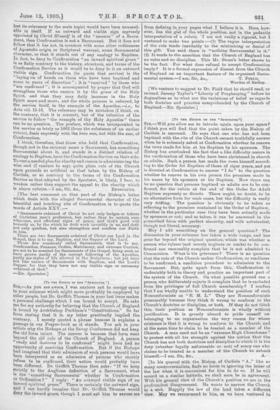[TO TUX EDITOR OW THE " SPEOTATOE."]
Sin,—As you are aware, I was anxious not to occupy space in your columns which might more profitably be employed by Other people, but Dr. G-riffith Thomas in your last issue makes a personal challenge which I am bound to accept. He asks Me for my authority for believing that the Churph of England is bound by Archbishop Peckham's "Constitutions." So far from qtating that it is, my letter practically implied the Contrary. I merely quoted a phrase because it explains a passage in oar Prayer-book as it stands. You ask in your article why the Bishops Et the Savoy Conference 414 not keep the old form intact. The answer is because that form went beyond the old rule of the Church of England. A person "ready and desirous to be confirmed" might have had no Opportunity of receiving Confirmation. But if the Bishops had imagined that their admission of such persons would have been interpreted as an admission of persons who stoutly refuse to be confirmed, their action would probably have been different. Dr. Griffith Thomas then asks: "If we keep strictly to the Anglican 'definition of a Sacrament, what it! the 'something Sacramental' whether in Confirmation or Ordination " I reply : "An outward visible sign of an inward spiritual grace." There is certainly the outward sign, and I can hardly imagine that Dr. Griffith Thomas would 4eny the inward grace, though I Faust aek him to OZ01100 me
from defining in your pages what I believe it is. Here, how- ever, lies the gist of the whole position, not in the pedantic.) interpretation of a rubric. 'I am not really a rigorist, but I ventured to make two points :--(1) The vague interpretation of the rule tends inevitably to the minimising or denial of this gift. You said there is "nothing Sacramental in it." (2) It tends to the assertion that the Church of England has no rules and no discipline. This Mr. Stone's letter shows to be the fact. For what does refusal to accept Confirmation imply P It is a formal expression of dissent from the Church of England on an important feature of its organised Sacra-
mental system.—I am, Sir, &a., T. FIELD,
Warden of Radley.
[We venture to suggest to Dr. Field that he should read, or re-read, Jeremy Taylor's "Liberty of Prophesying" before he dogmatises as to what are the variations of belief as regards both doctrine and practice comprehended by the Church of England.—ED. Spectator.]










































 Previous page
Previous page